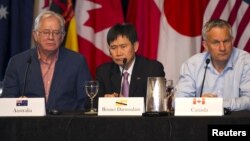There was no consensus Monday on how soon talks to conclude the Trans-Pacific Partnership trade pact could be revived after the 12 parties failed to reach a deal at what was intended to be the concluding round last week in Hawaii.
“The timing really is a challenge at this point, really driven by electoral politics,” Asia Trade Center executive director Deborah Elms told VOA via Skype.
A Canadian general election is scheduled for October 19 and campaigning began Sunday.
For the Canadians “to make a concession on dairy this close to the election I think is going to be even harder,” Elms told VOA.
The U.S. presidential primaries begin in January 2016.
Due to legally binding Congressional rules on trade, even if the negotiators are able to reach agreement late this month, Elms predicts, via Skype, that would leave U.S. lawmakers only a handful of days before they leave for the Christmas recess.
“When they come back they are in full election mode and no one is going to want to vote on trade in an election cycle,” Elms said.
Another meeting scheduled
Australia's trade minister, Andrew Robb, told the Australian Broadcasting Corporation that the TPP participants have agreed to meet again in a few weeks following the failure to cut a deal at the Hawaii talks he described as “pretty tension packed” with “a lot of anger at times.”
"I'm confident we will reach an agreement that's in the best interests of New Zealand in the coming weeks," Prime Minister John Key remarked at a news conference Monday following a Cabinet meeting in Wellington.
Japan's trade minister, Akira Amari, has told reporters he also wants to see fresh discussions by the end of this month.
Disagreements remain
Last week's negotiations became tangled, in particular, over the length of data protection to be granted to companies that develop pharmaceuticals and hold patents on them, according to Japan's largest circulation daily newspaper, the Yomiuri.
The Japanese newspaper, in an editorial calling for negotiations to resume promptly, placed some of the blame on the United States, home to many major pharmaceutical companies, for insisting on 12 years for data protection while Australia and New Zealand, eager to utilize generic drugs earlier, called for five years or fewer while Japan proposed a compromise at eight years.
Another issue stalling the secretive talks is in the automotive sector.
A late disagreement erupted between Mexico, an emerging automaker, and Japan, which sources parts from countries such as Thailand which are not a party to the TPP talks.
All of this leaves the process in “huge trouble,” according to Elms, unless the “stars align perfectly” to get a deal done this month then nothing is possible until 2017 when there “will be a whole set of new leaders around the table” and long after the current negotiators have quit.
The TPP participants represent 40 percent of global trade.
The countries in the negotiations have been Australia, Brunei, Canada, Chile, Japan, Malaysia, Mexico, New Zealand, Peru, Singapore, the United States and Vietnam.
Other parties, Colombia, the Philippines, South Korea, Taiwan and Thailand, since 2010, have announced their interest and could join a second wave of expansion if an initial deal is reached.




